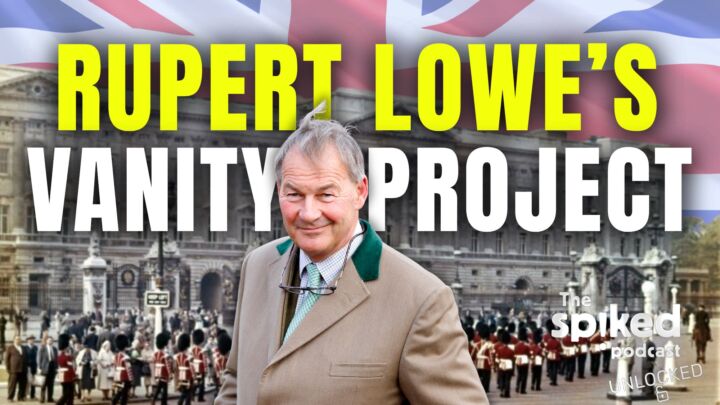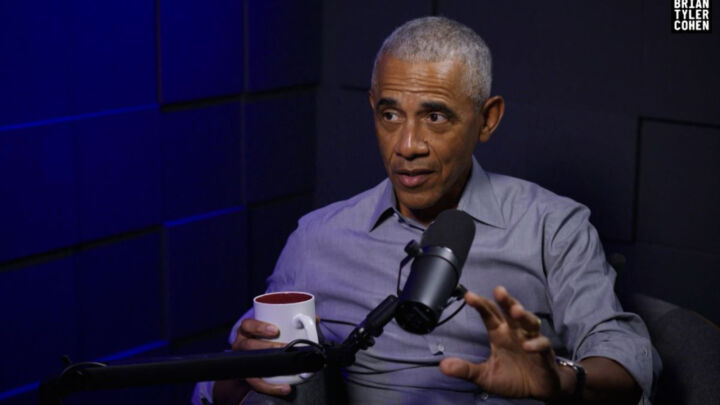Voices of the Poor – who’s talking?
A study published by the World Bank claims that the world's poor value 'wellbeing' over money. Don't believe a word of it.

Want unlimited, ad-free access? Become a spiked supporter.
A study published by the World Bank claims that the world’s poor value ‘wellbeing’ over money. Don’t believe a word of it.
Voices of the Poor is a major new study of poverty in the poorest countries in the world, based on interviews with 60,000 poor people in more than 50 countries over the period 1992 to 1999.
The study, claim World Bank Group president James Wolfensohn and UK secretary of state for international development Clare Short, presents a uniquely ‘authentic’ perspective on poverty. Turning its nose up at ‘the expertise of those who are not poor’, the study turns to ‘2.8billion poverty experts, the poor themselves’, to challenge us to reconceptualise our understanding of what constitutes development.
‘Historically’, concludes Voices of the Poor, ‘many development professionals have given priority to the material aspect of people’s lives’. However, ‘reflecting on the experiences of poor men and women’ has ‘driven’ the researchers to ‘revisit the meaning of development’.
So what, according to the study, have the voices of the poor told us?
Firstly, the poor have told us that their material aspirations are modest. ‘Materially’, the researchers convey, ‘enough for a good life is not a lot’. ‘I would like to live simply’, a young man from Ecuador is reported as saying. ‘I don’t like houses with too much inside….I would like a simple house…not big, or luxurious…a simple house with a floor.’
It is also noted that, the poorer people are, ‘the more a small improvement means’. ‘Money’, the report notes, ‘is mentioned less frequently than one might expect’.
The poor, we are told, ‘repeatedly distinguish between wealth and wellbeing’, which are seen as ‘different, even contradictory’. ‘A better life for me is to be healthy, peaceful and to live in love without hunger’, reports a 26-year-old woman from Ethiopia. ‘Love is more than anything. Money has no value in the absence of love.’
Wellbeing, not wealth, is apparently the poor’s desired outcome of development. Wellbeing, the study helpfully clarifies, is a concept which has ‘a psychological and spiritual dimension as a mental state of harmony, happiness and peace of mind’. The study goes on to draw attention to the frequent observation by its study teams that many poor communities are welcoming, hospitable and have well-developed social networks. From this it concludes that people, for example, in indigenous rural populations, ‘appear happier despite greater poverty’.
The voices of the poor have, it is claimed by this study, called for a reconceptualisation of the meaning of development. From an approach based on the primacy of material development, measured by increasing per capita income, the voices have called for a new approach which downgrades the importance of material transformation.
This demand for a reconceptualisation of development is repeatedly justified on the basis of the study’s ‘authentic’ voices of poverty. The study claims that it ‘simply offers a view of the world from the perspective of the poor’, and that ‘this book is about their voices’. But does this claim to reflect authentic voices stand up to scrutiny? Serious flaws in the approach of the study throw into question exactly whose voices are calling for the reconceptualisation of development.
The study claims to be participant-driven. Based on a participatory approach, the study actively engaged participants in the research process by using ‘open-ended and participatory methods’. This, it is claimed ‘allows for the emergence of issues and dimensions of poverty that are important to the community but not necessarily known to the researchers’.
Yet the research agenda was not set by the participants. Rather, it was predetermined by World Bank staff and the study researchers. For example, the theme of wellbeing was one of four aspects of inquiry. The researchers had previously decided to explore this theme by asking the participants for their ideas about ‘security, risk, vulnerability, opportunities, social exclusion, crime and conflict’. Researchers noted the difficulty of adequately conveying terms such as these to people who were not fully conversant with the latest Western intellectual buzzwords.
The participants were not even directly asked whether they regarded more income as integral in determining their wellbeing.
Further, the researchers actively intervened in the study process to elicit answers that they regarded as more desirable. For example, while the study claimed to ask the poor, impartially, for their problems and priorities, the study report notes that they ‘changed the sequencing of methods as needed’. Changing the sequencing to first asking about problems rather than priorities, for example, was justified on the ethical grounds of not unreasonably raising the hope of the participants. But the impact of taking everyday problems as the discussion’s starting point, rather than broader hopes or ambitions, would certainly be to marshall answers informed by lowered aspirations.
The study was also hostile to the idea of quantifying results, in favour of ‘documentation of what was said in poor people’s own words’. After interviewing 60,000 people, on what basis were the relatively few quotes cited selected? How, scientifically, can we regard them as anything other than personal, unrepresentative opinions?
The most damning indictment of this study, however, relates to its proposal to reconceptualise development on the basis of the ‘authenticity’ of the voices of the poor. The study report notes the ‘emotional stress, grief and despair that was sometimes unleashed among participants’ as they were encouraged to relive painful memories of living in poverty. One group of participants in Takhtakupyr, Uzbekistan, remembered:
‘The absence of bread and the necessity to send the children to the neighbour, since they had already gone to ask for bread several times before and hesitated to go again’; ‘The relative who died in the hospital because they could not buy the required medicine in time’; ‘Their children had forgotten the taste of sugar and meat’; ‘Their children could not go to school due to the absence of clothes and shoes’.
The study report notes: ‘All this caused tears of despair.’ Yet the conclusion of the report is that material wealth is not as important as a sense of wellbeing. Exactly which of the above problems would be resolved by a better sense of wellbeing, and which would be resolved by more money – a higher per capita income across the region or country, and a society which was able to develop materially in a more all-rounded fashion?
The report is packed with examples of the material desires of poor people, yet the study chooses to reinterpret the dominant desire as for ‘not a lot’ of material development and for wellbeing over wealth. The participants repeatedly emphasise their need for food, housing, clothes, jobs, land and for access to schools and health facilities. They aspire for infrastructure such as roads, transport, water and electricity. A substantial degree of material development is implicit if not explicit in these expressed needs and desires.
The report notes that many researchers had to go to great lengths to gain the trust of potential participants. Some young men in Jamaica were found to be ‘distrustful’ and ‘sceptical’, and so had to be ‘coaxed and interviewed at their place of relaxation’. In Bulgaria the researchers were assumed to be an American religious sect or spies, and so had to rely on ‘traditional Bulgarian ways of contacting people…through previous contacts, friends, and during informal evening discussions and social gatherings’.
It would perhaps be pertinent to ask, given the conclusion of the report, whether the trust gained was betrayed.
Indeed, in several instances the poor seem to have drawn their own conclusions. The study report recounts the experience in the refugee camp of Bratunac, Bosnia and Herzegovina, where ‘gaining the confidence and willingness of camp residents to participate [took] more effort than normal, as residents were highly suspicious towards outsiders, particularly towards anybody associated with international organisations, as many people have been through the camp and made promises that nothing ever came of’. Maybe this emerging phenomenon of participation-fatigue would be a more appropriate object for the researchers’ next inquiry.
The overall unreliability of the study methodology contrasts with the brash confidence of the study report in asserting that the poor desire a sense of wellbeing over material wealth. This suggests that the reconceptualisation of development has been ‘driven’ more by the researchers’ own opinions and preoccupations than by the poor themselves.
That the study was published and heavily promoted by the World Bank illustrates how influential reservations about promoting material development for the world’s poorest people have become. Yet the voices of the poor suggest that poor people have many material needs and desires still to be met. Now is not the time to start emphasising that ‘all you need is love’.
Voices of the Poor is a three volume study:
Vol 1: Can Anyone Hear Us? (2000) D Narayan with R Patel, K Schafft, A Rademacher, S Koch-Schulte
Vol 2: Crying Out for Change (2000) D Narayan, R Chambers, M Shah, P Petesch
Vol 3: From Many Lands (2001, forthcoming)
All published by Oxford University Press for the World Bank
John Pender researches and writes about the World Bank and development policy.
Read on:
Dam campaigns, by Kirk Leech
‘This sanctuary is a prison’, by Kirk Leech
You’ve hit your monthly free article limit.
Support spiked and get unlimited access.
Support spiked and get unlimited access
spiked is funded by readers like you. Only 0.1% of regular readers currently support us. If just 1% did, we could grow our team and step up the fight for free speech and democracy.
Become a spiked supporter and enjoy unlimited, ad-free access, bonus content and exclusive events – while helping to keep independent journalism alive.
Monthly support makes the biggest difference. Thank you.










Comments
Want to join the conversation?
Only spiked supporters and patrons, who donate regularly to us, can comment on our articles.